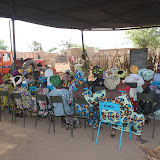
Friday, August 27, 2010
Shea Butter Formation Photos

Saturday, August 7, 2010
Tilefana tobi don o don
Since I moved to Kenieba last September, I have been eating lunch with my host family every day, enjoying some of the great food my host mom prepares. By Malian standards, she's a really good cook... most of the time we have white rice with a sauce (peanut sauce, leafy sauce, onion sauce) and cooked vegetables. At the beginning of July, my host mom, brother and sister left Kenieba to spend summer vacation in Bamako with relatives. They will be back in time for school at the end of September. So until then, I am cooking lunch for myself each day.
I was never much of a cook back in the states… I was a big fan of Trader Joe’s heat up and eat meals on the few occasions that I cooked for myself. Unfortunately there are no Trader Joe’s on the African continent, so I've been forced to teach myself how to cook. Cooking lunch every day for the past month or so has been an adventure. It has been fun to go down to the market and pick up some vegetables and other ingredients, then figure out what I can make with them. Unfortunately, since dry season just ended and the rains are starting up, it’s not the best time of the year to buy vegetables. Since Kenieba is so hard to get to, the only produce available is what is grown in the surrounding area. Some food products come from Bamako, but not easily perishable goods. For example, you can buy South African apples and Cote d’Ivoirian pineapples. We also get eggs, onions, garlic and potatoes from Bamako.
The vegetable that has been available in Kenieba recently is eggplant, so I use that with onions, garlic, various spices and tomato paste to make a decent vegetable marinara sauce. Combined with spaghetti that I get at the store next to my house, it makes for a good Italian meal. Thanks to sauce packets, I've also made some pesto with fresh basil. Basil is wild here and seems to sprout up everywhere, especially during rainy season. On some days you can buy lettuce and cucumbers, so I've made a decent salad with a balsamic vinaigrette (thanks to the balsamic vinegar sent over in a care package... thanks mom!) I've also bought green peppers in the market, and used onions and eggs to make a decent omelete.
When I tell people that I cook my own lunches, most everyone (especially men) can't believe that I cook for myself. Gender roles are very strict here. I have never seen a Malian man cooking meals, cleaning up a house, or doing other household chores. His role is to work in the fields, raising crops and bring in income for the family, essentially putting food on the table. It's great to tell them about how men and women share these duties in the US, how men sometimes cook and clean, and some women have important jobs and bring in money for their families.
Sunday, August 1, 2010
Gold Mining in Mali
"Seeking to take advantage of high metals prices by developing mining, which recently overtook cotton as the country's biggest export earner, Mali is looking to introduce a new mining code later this year."Gold mining is the dominant economic activity in the region of Mali where I live and work. Many people who live there go out to distant, uninhabited areas and mine for gold using traditional methods with rudimentary tools. Some people strike it rich, but most are lucky to make even a little money after a week's work. I haven't had the opportunity to visit one of these traditional mines, but my friend Dan wrote a great post about his visit to a mine near his site.